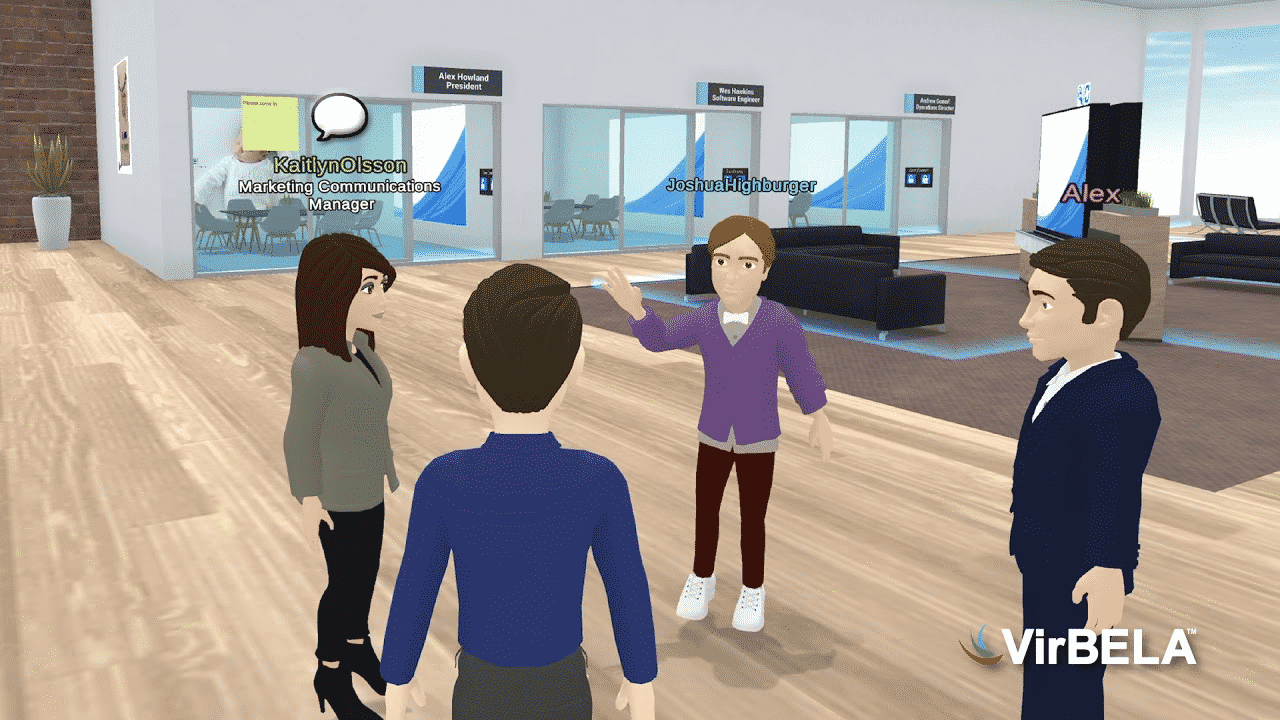Reflecting back on my 26-year career in real estate, I have seen a lot of changes to real estate brokerages. Most of the changes have been in the use of technology to serve more agents, but the pandemic of 2020 may have forever changed the way real estate brokerages use brick-and-mortar office space.
So the question is: Will real estate brokerages even need brick-and-mortar offices in the future? In this article, I’ll go over the pros and cons of brick-and-mortar offices in 2022, plus alternatives like co-working spaces and virtual brokerages.
Office Use Has Already Been on a Decline

In the early 2000s, customers no longer needed to come to the office to sign contracts thanks to home computers, printers, and the fax machine. Even prior to the pandemic, with high-speed internet, low-cost printers, and e-signatures, real estate agents were mostly working from home and coming to the brokerage office far less frequently.
When I had my real estate brokerage, to fill my empty private offices, I tried to incentivize agents by offering them reduced fees if they worked from the office. I asked one top producer why he doesn’t spend more time in the office and he replied, “Nobody here is going to buy or sell a house with me, and I can do my work from a coffee shop and actually meet potential buyers and sellers.” It is hard to argue with logic when you agree with it.
My experience of owning and coaching real estate brokerages has shown me that only between 10% and 20% of the agents (depending on the tenure of the agents) actually use a private or shared office. The remainder of the agents are working via mobile or from home, and this trend is likely to continue. Therefore, many brokerages went to an “open floor plan” concept that provides comfortable spaces for agents to drop into and “hot desk” setups where agents do not even have a dedicated desk space to work.
The question now is has the massive increase in working from home because of the pandemic further changed that trend, and if so, is it likely to stay that way?
The Pandemic Has Forever Changed the Brokerage Model

While working from the brick-and-mortar office was already on a decline, in my brokerage, we tried offering our team meetings and classes virtually. We thought that many of the agents would appreciate being able to participate from home using Zoom. What we found was that some seasoned real estate agents had little motivation to adapt to the technology needed to work remotely.
While the idea wasn’t necessarily ahead of its time, many of the agents still struggled to understand how to use Zoom. Teaching them how to download the app and log in was the first obstacle, but it was the pure lack of “Zoom etiquette” (like dogs barking and an unknowing agent on camera in her unmentionables) that ultimately killed the idea.
Today, the pandemic and lockdowns have forced brokerages and agents alike to learn and adapt to the technology to work and interact remotely. Even the most unwilling and techno-incompetent are now able to log onto Zoom and participate in online classes and team meetings. Some agents have even found creative ways to provide virtual showings and open houses in areas with strict lockdown restrictions.
So this leaves the question: What exactly do we need the brick-and-mortar brokerage office for now? If I decided to start a new brokerage today, would I even bother with the expense and hassle of renting an office or would I jump right to a virtual brokerage?
Are Virtual Brokerages the Solution?

A virtual, or “cloud-based,” brokerage is one without a local, physical brokerage office. Many of the larger cloud-based brokerages, like EXP Realty, have proprietary software solutions that allow agents to virtually talk to the support staff for things like technical support, commission disbursement agreements, and even meet with their managing broker.
Prior to the pandemic, the idea of talking to your managing broker or having your team meeting virtually seemed more like novelty than reality. Today, nearly every brokerage and agent has adapted to this new realty. Therefore it seems now more than ever virtual brokerages are the way of the future.
The Benefits of a Virtual Brokerage
Potentially Lower Startup Costs
To the novice, it would seem that a virtual brokerage would cost much less to start than a traditional brick-and-mortar brokerage, but anyone who has invested in buying or creating proprietary software knows that software development can cost millions of dollars. In fact EXP paid $11 million dollars to purchase their proprietary software Virbella.
That being said, it is possible to start and operate a virtual brokerage with over-the-counter software like Lone Wolf for the commission and financial management, Slack for team communication, and Zoom for meetings and training. This combined with the fact that you won’t be spending tens of thousands of dollars on leasing and setting up an office can save you money over a brick-and-mortar startup.
Quicker Expansion & Easier to Scale
One of the greatest challenges with a brick-and-mortar brokerage is the risk and cost of expansion. When I had my brokerage, we expanded into four different markets. The cost to do this exceeded $600,000. Even with our large investment and good intentions, one of our offices quickly failed, resulting in a loss of over $100,000.
Virtual brokerages don’t have these risks. Since they are cloud-based and all agents access their brokerage services through the internet, your brokerage can quickly expand into other markets and even small submarkets that larger traditional brokerages tend to overlook.
Tech-savvy Agents
By necessity or by design, a virtual brokerage is more likely to attract independent, experienced, and tech-savvy agents. New and newer agents who need a lot of handholding will likely struggle in this environment, and the less technical will completely avoid it.
Lower Operating Costs
Once your overall startup investment is made in the cloud-based infrastructure, the operational costs or cost per agent of running a virtual brokerage should (theoretically) be lower than operating a brick-and-mortar brokerage. This is simply because you are saving tens of thousands of dollars a year that you would normally be spending on rent.
Better Splits & Fees to Agents
The cost savings over the brick-and-mortar brokerage won’t necessarily go directly into your pocket. Much, if not all, of this savings will likely be passed on to the agents in the form of lower splits and fees than your traditional brokerage competitors.
Lower splits and fees do two things: On the positive, it can attract top-producing agents and teams that have their own staff and offices and are looking for lower brokerage expenses. On the negative side, lower fees also attract part-time and low-producing agents that are just looking to save money on the one to two transactions they do each year. You will want to keep this in mind when determining the type of agent you wish to attract to your brokerage.
Don’t break out your “Programming for Dummies” book and start a virtual brokerage just yet, though! Before you make this important decision, you must weigh it against the benefits of a brick-and-mortar office.
Are Brick & Mortar Offices Still Needed?

Before you tear up your office lease and go 100% virtual, there may be some reasons to keep your brick-and-mortar office. Remember the old saying, “Before you take down a fence, know why it was built.”
Well, there were many reasons why you needed an office in the first place, and some of those reasons haven’t changed. Here are seven reasons why you might want a brick-and-mortar office that you might not have thought of:
7 Reasons for a Brick & Mortar Real Estate Office
1. State Requirements
Some states require you to have a physical address for your brokerage. In some states, your home address may be sufficient to meet the requirements; other states may require a location suitable for business operations.
2. New Agent Training
If your brokerage has, or plans to have, new agents, then you probably want an office to train them in. It’s no secret that new agents need more attention than seasoned professionals. An office allows them a comfortable place to come to ask questions, take classes, and build good lead generation habits.
3. Private & Shared Offices
Although the trend has been leaning toward the majority of agents working from home, many may still want to go to an office. Some agents feel more productive if they get out of the house to go to work, others may not have the ability to work from home due to small children or other distractions, and some like to socialize. This creates an opportunity for brokerages that wish to still cater to agents that want or need a private or shared office to go to each day.
4. Brokerage Culture
The culture of your brokerage probably isn’t the main reason agents will join your brokerage, but it is the main reason they will choose to stay. Culture is a real world demonstration of the Mission, Vision, and Values of your brokerage. It is extremely difficult to build a culture in the absence of social interactions. An office provides opportunities for social interactions, both planned and spontaneous.
While it isn’t impossible to do this without a brick-and-mortar office, it is much more challenging. Camaraderie is important for salespeople. While apps like Slack make this somewhat easier, the older agents who will likely be your top producers generally prefer in-person communication. It’s hard to share a laugh with a colleague after a tough cold call on Slack.
5. Services
The typical services a real estate brokerage provides are not limited to broker supervision and file management. Many brokerages also offer agent marketing, listing marketing, and transaction coordination, as well as printing and presentation services.
Today, many brokerage administration services are easily managed either virtually or online. But anyone who has had to stand in line at Office Depot’s Print & Copy Services department knows that the ability to quickly create printable marketing and custom presentations without the support of someone who has a vested interest in your success is beyond frustrating.
Like many brokerages, one of my brokerage’s most important services was to help our agents look and feel professional, and the printing and marketing pieces are a big part of that. A brick-and-mortar office provides a convenient place where your agents can have quick access to the equipment, services, and professional staff that will help them look top-notch.
6. Branding
An office can be much more than a place to print fliers and catch up on the latest industry news or gossip around the water cooler. A well-placed office with visible signage can help build brand awareness in your area. It can also show your customers and agents alike your commitment to the community and the vision of your brokerage. Let’s face it—if you are willing to invest your hard-earned money into a long-term lease and the fixtures, finishes, and equipment of your office, you’re likely committed to being around a long time.
7. Image
Call it ego, call it pride. There is something about walking into a professional office surrounded by Porsche Cayennes and BMWs. I always used to meet customers at my office because we had a beautiful office. I wanted them to see it! I can’t speak for you, but I FEEL more successful, professional, and productive in a professional-looking office.
Of course, signing a multiyear lease on a flashy office isn’t all wine and roses. There are two things you must consider before jumping into a brick-and-mortar office. The first is the large upfront cost of tenant finishes, furniture, and equipment, and the second is committing to a long-term lease. But, what if there was another option between a brick-and-mortar office and going completely virtual, one that doesn’t require you to take all the financial risk? Well, there is—it’s called co-working space.
Is Co-working Space a Good Option for Your Brokerage?

Co-working space is typically high-end professional office space that is shared with multiple companies and other independent contractors.
If your brokerage is fewer than 20 agents, co-working space may be the right solution. This is because smaller brokerages usually have less need for office space; they are usually too small to have multiple full-time staff, a new agent training schedule, or more than one or two agents who need private offices.
The challenge with co-working space is when your brokerage is greater than 20 agents or if the value proposition of your brokerage is a full-service marketing team. Co-working space requires you to share common areas like the kitchen, presentation rooms, and conference rooms with other individuals and companies. This can lead to scheduling conflicts for your in-person training classes and team meetings.
The other issue is the overall cost. If your brokerage is small, co-working space can save you money. Yet the larger your brokerage gets, the more costly the co-working space becomes. Most co-working spaces include the utilities, internet, and cleaning in the lease rate. The lease rates range from $80 to $120 per square foot, plus there are typically additional costs for use of the conference rooms and training rooms.
However, in a traditional office, your lease rate is much lower, ranging from $20 to $50 per square foot, plus the costs of utilities, internet, phones, cleaning, and so on. Therefore, if you are only renting a small 8×6-foot office in a co-working space, you may only pay $400 a month, but as you grow and need more space for agents and staff, your monthly costs and additional fees can quickly exceed the cost of leasing your own brick-and-mortar brokerage office.
Bottom Line
While the pandemic has certainly disrupted the brick-and-mortar real estate office, it likely won’t eliminate it completely. If you are like me, you enjoy the flexibility of working from home but miss the social aspects and intentful focus an office environment brings.
Most of us in real estate are social and enjoy the spontaneous interactions with other agents and staff. This is the main reason why I believe real estate brokerages will still offer some type of brick-and-mortar offices in the future. Social interactions create culture, and a strong culture equals agent retention. It’s that simple!
Therefore, if I was starting a brokerage today, I would still provide a small brick-and-mortar office while offering virtual services—the best of both worlds!


